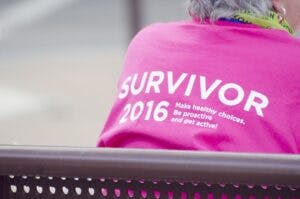Who is at Risk for Developing Breast Cancer?

One of the most common misconceptions about breast cancer is that 100% of individuals with this disease are women.

Although most breast cancers are in women over the age of 50, men are also at risk for developing breast cancer. The topic may seem taboo and uncommon but self-exams can help men catch any lumps, bumps or irregularities in their breasts.
What Are Some Risk Factors?
There are several risk factors that can increase the chances an individual will develop breast cancer during their lifetime. The following risk factors range between preventable measures and genetic makeup that is inevitable. Risk factors include but are not limited to:
- Family history and genetic mutations. BRCA1 and BRCA2 are genes that can live in your body and can increase the chances you will develop breast cancer and possibly ovarian cancer.
- Aging can cause your body to undo many changes. Since most forms of breast cancer are found in women over the age of 50, aging can be a catalyst of breast cancer.
- Being a late bloomer when it comes to pregnancy or menopause. If you have a child at a later age in life or you are older than the average woman when you go through menopause, your hormones may cause you to have an increased risk of developing breast cancer.
- If you have been on an oral contraceptive for several years. Certain oral contraceptives have been linked to developing breast cancer.
- Drinking alcohol and smoking increases the chances of an individual developing breast cancer.
- Having natural dense breasts can increase chances of developing breast cancer, as they will have more connective tissue than fatty tissue.
It is advised to speak with your doctor regarding specific risks of developing breast cancer. Your medical professional will be able to asses your risk factors based on your lifestyle and daily activity.
How Can You Reduce Your Risks?
It is advised to speak with your medical professional regarding the risks that you have to develop breast cancer, as they can vary from person to person based on lifestyle choices. However, there are general guidelines you can use to live a healthier and happier life, while reducing the risk of developing breast cancer. These include but are not limited to:

- Look into genetic testing if breast cancer runs in your family. Whether you are male or female, it is important to inquire about your family history. If you qualify for the BRCA1 or BRCA2 genetic testing, it is advised you speak with a medical professional to acquire the test.
- Keep your weight in check. Maintaining a healthy weight can keep you healthy and decrease your chances of developing illness or disease, including breast cancer.
- Get physical! By staying physically active, the risk of developing a disease or illness is decreased. It is important to speak to your doctor before participating in exercise and to learn the proper form and technique of the exercises before executing them.
- Eat a balanced diet. It is advised that you eat the proper nutrients your body needs in order to be fueled and thrive. Eating lots of fruits and vegetables and limiting the amount of processed food you eat will keep your body healthy and ward off disease and illnesses.
- Do not smoke or drink alcohol in excess. It is important that all aspects of your life, beyond diet and exercise, reflect a healthy and balanced mindset. Avoid smoking or drinking alcohol in excess to reduce the risk of developing breast cancer.
- One of the most important things an individual can do to fight of the risk of developing breast cancer is to visit the doctor regularly. This includes your general practitioner, your gynecologist, your dentist, etc. Your mammograms, physicals and yearly exams are an imperative part of keeping yourself healthy.
